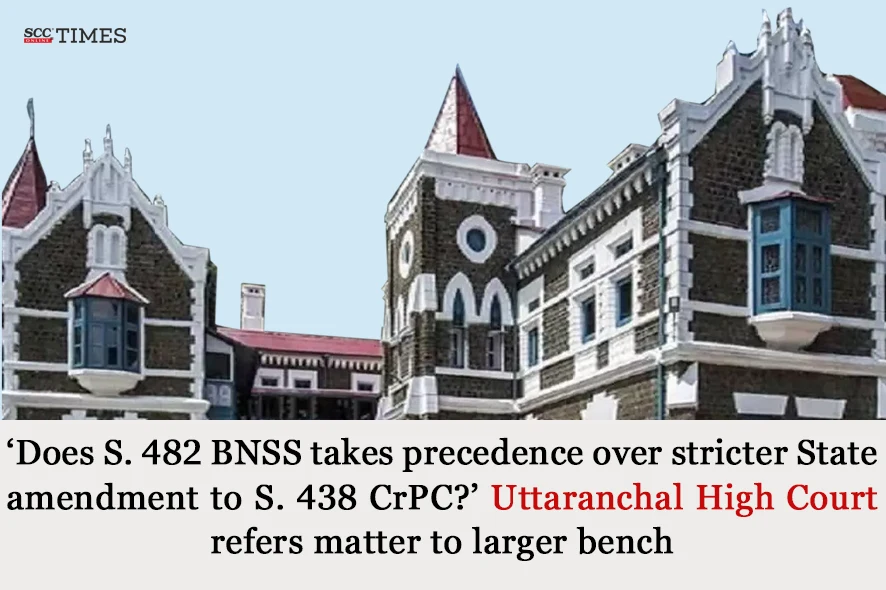Uttaranchal High Court: In a batch of anticipatory bail applications filed by the applicants, the Single-Judge Bench of Alok Kumar Verma, J., while hearing a preliminary objection on their maintainability, referred the matter to a larger bench. The Court held that the provisions of the Bharatiya Nagarik Suraksha Sanhita, 2023 (‘BNSS’) should prevail over the earlier Uttarakhand State Amendment to Section 438 of the Criminal Procedure Code, 1973 (‘CrPC’). The Court noted that the BNSS, being a more liberal law, is beneficial to the accused and should apply regardless of when the case originated.
Background
Multiple Anticipatory Bail Applications were filed before the Court under Section 482 of the BNSS in various matters related to different offences. The State amendment to Section 438 of the CrPC, as introduced by the State, made the provision of anticipatory bail inapplicable to several offences, including those under the Protection of Children from Sexual Offences Act, 2012, the Narcotic Drugs and Psychotropic Substances Act, 1985, and the Uttarakhand Gangsters and Anti-Social Activities (Prevention) Act, 1986. Therefore, it was argued that these anticipatory bail applications were liable to be rejected.
Analysis and Decision
The Court noted that the main issue was the applicability of Section 438 of the CrPC, as amended by the State, and the BNSS, to ongoing proceedings.
The court emphasised that,
“The provision of anticipatory bail is rooted in the fundamental right to personal liberty. It is a pre-emptive measure to safeguard personal liberty against false accusation or misuse of the law. Anticipatory bail is a safeguard against arbitrary arrest. Liberty is the very quintessence of a civilized existence. The BNSS is also upholding the importance of protecting personal liberty. The restrictions on granting anticipatory bail under Section 438(6) of the CrPC (as amended by the State of Uttarakhand) are no longer in effect.”
The Court noted that the ‘principle of implied repeal’ or ‘repeal by necessary implication’ may be applied to determine repugnancy for the purpose of Article 254(2) of the Constitution. The Court further noted that,
“If the Parliament, in exercising its power under proviso to Article 254(2) makes a law adding, amending or repealing the law, predominance secured by the State law by the assent of the President is taken away and the repugnant State law though it became valid by virtue of President’s assent would be void.”
The Court noted that the State has not made any amendment to Section 482 of the BNSS, after its enactment, suggesting a conscious decision to remove the prohibition from Section 438(6) of the CrPC.
The Court further noted that in M. Ravindran v. Directorate of Revenue Intelligence, (2021) 2 SCC 485, the Supreme Court held that in case of ambiguity in a penal statute, courts must favour interpretations that protect the rights of the accused. Further in T. Barai v. Henry Ah Hoe, (1983) 1 SCC 177, it was held that when a later statute provides a more liberal procedure or reduced punishment, the accused should benefit from it, regardless of when their case originated.
The Court observed that the accused should be entitled to the benefit of the more liberal provisions introduced by the BNSS.
The Court referred the matter to a larger bench to determine the following question of law:
“Whether the provision of Section 482 of the Bharatiya Nagarik Suraksha Sanhita, 2023 would prevail over the Uttarakhand State Amendment under Section 438 of the Code of Criminal Procedure, 1973 and since the provisions of the Sanhita, 2023 are beneficial to the accused, can it be applied with respect to earlier cases (regardless of when the case of the accused originated)?”.
The registry was directed to place the matter before the Chief Justice for an appropriate order.
[Harish Kumar Prajapati v. Central Bureau of Investigation, Anti Corruption Branch, Dehradun, 2025 SCC OnLine Utt 2524, decided on 04-08-2025]
Advocates who appeared in this case:
For the Petitioner: Prabha Nainthani, Advocate
For the Respondent: Piyush Garg, Advocate




